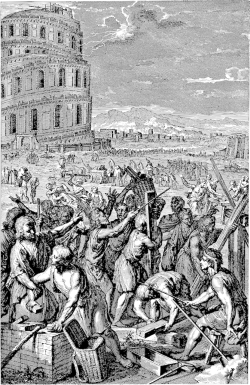To close out our series on Biblical Anthropology, I’m going to try to pull everything together in just a few posts. But if you’re actually following the series, I encourage you to read it all, because there will be a lot more holes in this summary if you don’t!
If you have started at the beginning, you may remember how it all began:
About 3500 years ago, and old man begin to write. The first three words completely change our understanding of reality. The first seven words change our understanding of the cosmos. And with just a few phrases, our understanding of how the world works, who we are, the purpose of life and the concept of love is completely transformed.
These words are so revolutionary, so surprising, so transforming, that we really cannot exaggerate their importance.
7 Hebrew Words
Do you remember what the words were? “In the beginning, God created the heavens and the earth.” (Genesis 1:1)
When I started the series in our church, I really had no idea just how important those words really were. And how important the first few chapters of Genesis really are.
Biblical Anthropology – the study of human beings from a biblical perspective. Who am I?
And everything began, everything must begin, with He who had no beginning. The eternal God.
Now, here’s the first exam question. In our first studies we emphasized three words. Do you remember what they were?
You cheated, you read this paragraph, didn’t you? Well, anyway, you’re correct. Truth, Dependence, and Purpose.
The Bible is a solid foundation for the truth, and that means all truth. Why? Because the Bible explains how it is possible for us to know anything at all.
How do we know that the laws of nature are consistent? Well, for example in Jeremiah 33 God explains that He has made a covenant with day and night, and the established laws of the heavens and the earth. A consistent and faithful God is the source and origin of all trust and loyalty.
If we’re here simply by chance, simply chemicals in bags of skin, how can we know any truth? But – what if a God of order wants us to know Him through His creation? God wants us to know truth, and so to know Him.
All logic and science comes from a Christian worldview.
Dependence. We depend on something outside of ourselves, and all things ultimately depend on God. We are limited – finite. God is unlimited and infinite. Without beginning or end, without cause, transcendent.
Purpose. Of course, a random cosmos with no God has no purpose or significance. What is – is. But in the real universe, all purpose comes from God, and the pattern of God’s creation.
The purpose of the earth…
For thus says the LORD,
who created the heavens
(he is God!),
who formed the earth and made it
(he established it;
he did not create it empty,
he formed it to be inhabited!):
“I am the LORD, and there is no other…”
Isaiah 45:18
The purpose of humans…
…male and female he created them. And God blessed them. And God said to them, “Be fruitful and multiply and fill the earth and subdue it, and have dominion over the fish of the sea and over the birds of the heavens and over every living thing that moves on the earth.”
Genesis 1:27-28
The sexes, families, and much more – come from God’s Word.
But although there are many purposes, there is a principle one. “…our Lord and God…you created all things, and by your will they existed and were created…” (Revelation 4:11) The Son of God – “all things were created through him and for him” (Colossians 1:16). “The heavens proclaim his righteousness, and all the peoples see his glory” (Psalm 97:6).
What should be the response of all creation? “Let them praise the name of the LORD! For he commanded and they were created” (Psalm 148:5).
But instead of praising the Creator, the man fell into sin. The man sinned, the woman sinned, I sinned, and you sinned. We “suppress the truth” in unrighteousness (Romans 1:18). We do not want to depend on God (although, of course, every breath still comes from Him). We don’t want His purpose for our lives. We reject His truth.
Of course, there is no “other truth”. Just – the truth. And pay attention here – what happens when we reject God’s truth, and choose our own lies (which we call “truth”)? I’ll tell you – it turns into “my truth vs. your truth”.
And the strongest tyrant can force his “truth” on us. Rejecting God’s truth is the end of freedom. And we’re seeing this played out today.
Speaking for myself, one of the most important lessons in this study was how really horrible sin is. We use that word all the time in the church, “sin”, and we link it with the word “forgiveness”, and somehow through it all we forget that we really are responsible for our sinful actions.
We see how terrible sin is in the cross of Christ. The Holy and Pure Son of God suffered voluntarily the shame and punishment to show us just how far we had wandered.
Every sin, great or small, that sprouts in our hearts, is an ugly, disgusting, putrid offence to God. God hates sin, and is completely just to throw sinners into eternal hell.
But that leads us to “The Great Universal Project of Humanity” – do you remember what that is? It is the ongoing and impossible project of justifying ourselves.
We talked about Aleksandr Solzhenitsyn, who survived a terrible persecution under communism. What was it he said?
If only it were all so simple. If only there were evil people somewhere, insidiously committing evil deeds, and it were necessary only to separate them from the rest of us, and destroy them. But the line dividing good and evil cuts through the heart of every human being. And who is willing to destroy a piece of his own heart.
Aleksandr Solzhenitsyn (The Gulag Archipelago 1918-1956)
We are responsible for our sin. We are responsible to change. But – “trying to change” never brings salvation.
But – there is salvation. “And there is salvation in no one else, for there is no other name under heaven given among men by which we must be saved” (Acts 4:12). That is, the Name of Jesus Christ of Nazareth.
That is the Creation, and the Fall. Or, as we said in the second section, Christ or Chaos. (I’m still going to talk about the origin of that phrase – stay tuned.)
That’s a quick look at the first two lessons – “The Beginning” and “Christ or Chaos”. Feel free to go back and look at them again. And in a bit we’ll continue our whirlwind summary…




